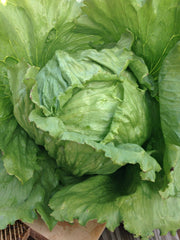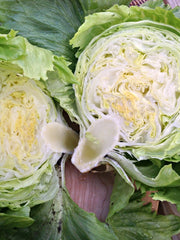Lettuce, 'Summertime'
(Lactuca sativa) …and the livin’ is easy. We might lose some people here, but we are waving the flag for an iceberg lettuce comeback. Hating on icebergs has become totally cliché. Vegetable styrofoam, textured water…we’ve heard them all. Get over it, cool club! Seriously, I’m not talking about weeks-old cello-wrapped heads from the supermarket… have you ever even eaten it fresh out of the garden? Years ago, we grew summertime sort of as a joke. We were eating it over a farm lunch in the fields, dipping wedges of a head in salad dressing, and eventually, we all broke down into laughter as making conversation over the noise of the crunching was impossible. Look, crunchy lettuce is fun, and any vegetable that can make me laugh out loud has earned a welcome home in my garden. Crisp, tight heads, very slow to bolt (so much so that it’s actually really hard to produce seed for), and a party in your mouth. Oregon State Univ. bred.
60-65 days. UO
Packet: 1g (~800 seeds)
Availability: In stock
Growing Info
SOWING:
Sow indoors 2-4 weeks before your last frost. Seeds germinate best below 70F.
Transplant out 3-4 week-old plants.
Direct seed after last frost.
Sow every 3 weeks until 6 weeks before first Fall frost date for constant lettuce.
Note: Seeds will become dormant if exposed to high temperatures. Lettuce grows best in cooler weather.
PLANTING DEPTH:
1/8"
SPACING:
10-12" in rows 12-15" apart.
EMERGENCE:
5-7 days @ soil temp 68F and lower.
LIGHT:
Full sun to part shade
FERTILITY:
Medium. Prefers well-drained, with balanced fertility and evenly moist soil. Lettuce is sensitive to low pH.
ADDITIONAL NOTES:
Uneven watering can result in tip burn, the browning of the leaf margins, which is caused by the plant's inability to move calcium to the growing edge fast enough to meet its growth needs. If this seems to be a problem, consistent, evenly moist soil or calcium amendments can be beneficial.
Hot weather can cause premature bolting. Generally, when the plants begin to stretch upwards (to flower), the leaves become bitter, and the eating quality is poor.




